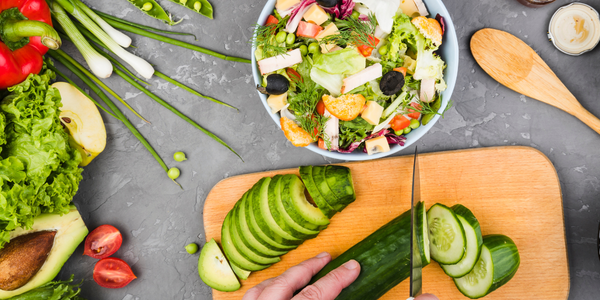Magnesium-Rich Foods for Vegetarians: Ensuring Adequate Intake Without Supplements
Magnesium is a quiet contributor to your overall health. This essential mineral is involved in over 300 biochemical processes in the body, from supporting nerve function and maintaining healthy muscles to regulating energy production and blood sugar levels [NIH]. For vegetarians, ensuring adequate magnesium intake is particularly important, as plant-based diets can sometimes fall short of providing optimal levels.
In this guide, we’ll explore the world of magnesium-rich foods and how you can effortlessly incorporate these nutrient powerhouses into your diet.
Top Magnesium-Rich Foods for Vegetarians
1.Dark Leafy Greens
Spinach, kale, and Swiss chard aren’t just good for your smoothies and salads; they’re also some of the best sources of magnesium. Just one cup of cooked spinach packs an impressive 157 mg of magnesium, about 40% of your daily recommended intake. Sauté these greens with olive oil and garlic, or blend them into a green smoothie for a nutritious boost.
2. Nuts and Seeds
Almonds, cashews, and pumpkin seeds are compact yet nutrient-dense magnesium foods. A handful of almonds (about 1 ounce) provides 80 mg of magnesium. Pumpkin seeds go even further, offering 150 mg per ounce. Sprinkle seeds over your yogurt or oatmeal, or enjoy a handful of nuts as a satisfying snack.
3. Legumes
Beans, lentils, and chickpeas are not only high in plant-based protein but also excellent natural sources of magnesium. Black beans and edamame, in particular, stand out, with one cup of cooked black beans delivering around 120 mg of magnesium. Add these legumes to soups, stews, or salads to amplify your nutrient intake.
4. Whole Grains
Quinoa, brown rice, oats, and buckwheat are staples in a magnesium vegan diet. Quinoa, for example, offers about 118 mg of magnesium per cooked cup. These grains are versatile and can be used in everything from breakfast bowls to hearty main dishes. Bonus? They’re also gluten-free!
5. Avocado
This beloved fruit isn’t just a source of healthy fats; it’s also a sneaky source of magnesium for vegetarians. One medium avocado contains roughly 58 mg of magnesium. Add it to toast, salads, or smoothies for a creamy, magnesium-rich treat.
6. Dark Chocolate
Yes, you read that right. Dark chocolate (at least 70% cacao) is a delightful source of magnesium for vegetarians, with one ounce containing around 64 mg. Look for minimally processed options to keep added sugars in check and savor it as an occasional indulgence.
7. Fruits
Bananas, figs, and dried apricots are among the best sources of magnesium in the fruit category. While bananas are better known for their potassium content, one medium banana provides 32 mg of magnesium. Combine these fruits with nuts for a nutrient-packed snack.
8. Tofu
For vegetarians seeking a versatile ingredient rich in magnesium, tofu is a winner. Half a cup of firm tofu delivers about 37 mg of magnesium. Use it in stir-fries, soups, or even desserts to maximize its nutritional benefits.
Tips for Optimizing Magnesium Absorption
While including magnesium-rich foods in your diet is essential, maximizing absorption is equally important. Here are some tips to make the most of your natural sources of magnesium:
- Pair with Vitamin D: Vitamin D enhances magnesium absorption, so include fortified plant-based milks or spend time in the sunlight.
- Limit Excess Calcium: High doses of calcium can compete with magnesium absorption. Aim for a balanced intake of both.
- Cook Smart: Light steaming or cooking can reduce the levels of anti-nutrients like oxalates in certain vegetables, improving magnesium bioavailability.
- Diversify Your Plate: Rotate your magnesium foods to ensure a variety of nutrients and avoid reliance on a single food source.
When to Consider a Magnesium Supplement
Despite your best efforts, there may be times when hitting your magnesium targets through diet alone feels challenging. For example, people with digestive disorders, high levels of stress, or certain medical conditions might have higher magnesium needs. In such cases, a high-quality magnesium supplement can help fill the gap.
Look for supplements that use bioavailable forms of magnesium, such as magnesium glycinate, citrate, or malate. These are gentle on the stomach and effectively absorbed by the body. Always consult with a healthcare professional before starting a supplement to ensure it’s right for your needs.
For vegetarians, ensuring an adequate intake of magnesium doesn’t have to be daunting. By focusing on a diverse array of magnesium-rich foods like dark leafy greens, nuts, seeds, legumes, and whole grains, you can support your body’s essential functions naturally. Keep an eye on how your body feels and don’t hesitate to seek professional guidance if you think you might need additional support through a magnesium supplement. After all, prioritizing magnesium is about more than meeting a daily number—it’s about empowering your body to thrive in every way.

























